If you have a Gmail, Youtube or Google+ account you should have received an email from Google today announcing their new Privacy Policy.
Dear Google user,
We’re getting rid of over 60 different privacy policies across Google and replacing them with one that’s a lot shorter and easier to read. Our new policy covers multiple products and features, reflecting our desire to create one beautifully simple and intuitive experience across Google.

In 2009 Google for the first time started collecting a new type of data about the websites people visit and using it to promote targeted advertisements. But Google has taken it to the next level.
What does this mean for you?
Ultimately, it makes it harder for Google users to remain anonymous as Google Inc. admitted it would begin combing it’s user’s information and tracking their online behaviours.
When searching via Google, the world’s most popular search engine will take into consideration the user’s activities on Gmail, Youtube, Android and other Google accounts to influence the search results.
In June 2011, at The Wall Street Journal’s All Things Digital Conference, Google Executive Chairman Eric Schmidt said,
Google will remain a place where you can do anonymous searches. We’re very committed to having you have control over the information we have about you. So, for example, if you want to continue to use Google and don’t log in, and don’t tell us who you are, that will continue to be true forever.
This will remain the case for internet users who are not logged into their Gmail, Google+, YouTube or Android phone account. However, as Google’s services become more ubiquitous and integrated it will become difficult for users to trust that promise of anonymity.
Google has the power to track consumers online and in the not-so-virtual world, thanks to smart phone technology.
In the email sent to users, Google said that it isn’t collecting any new information, just combining it to provide better service to customers. For example, a user could be alerted that they were going to be late to a meeting based on Google’s analysis of the user’s location, calendar and analysis of traffic on the road to the meeting.
Our goal is to provide you with as much transparency and choice as possible.
Google added that it would continue its policy of not combining user’s personal information with data about their Web browsing collected by its DoubleClick advertising network.
We’ll treat you as a single user across all our products, which will mean a simpler, more intuitive Google experience.” ~ blogged Alma Whitten, Google’s director of Privacy, Product and Engineering.
Last year Google signed a privacy agreement with the Federal Trade Commission, which requires Google to ask users for permission before changing privacy settings. This month (January 2012), Google launched an advertising campaign staking its commitment to privacy.
So why the change of heart?
Until recently, Google had refrained from exploiting its own user data to promote tailored online advertisements, fearing a backlash. But last June, the game changed.
With the exponential growth of rivals and user’s demonstrable willingness to divulge and share information about themselves, the company launched its answer to Facebook and Twitter – Google+.
Already, Google has started including data from Google+ in members’ search results. Their new policy which will take effect on March 01, 2012, allows them to include insights from their Gmail and Youtube services to search results as well.
Such integration** enables Google to better target online advertisements to website visitors based on what it knows about their personal data, interests and online/consumer behavior.
In the past few years Facebook has amassed an unprecedented amount of data about the lives of its more than 800 million members — information that is coveted by advertisers.
Traditionally, Google hasn’t had quite so much detail about its users and has kept much of its personal data separate.
Before Facebook unleashes its planned initial public offering in coming months, Google has upped the ante.
**Signing up for a Gmail account now automatically creates a Google+ account.

Leave a Reply
You must be logged in to post a comment.